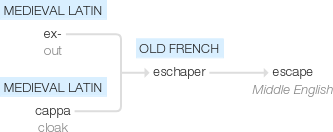Escape
Middle English: from Old French eschaper, based on medieval Latin ex- ‘out’ + cappa ‘cloak’. Compare with escapade.
wiktionary
From Middle English escapen, from Anglo-Norman and Old Northern French escaper ( = Old French eschaper, modern French échapper), from Vulgar Latin *excappāre, literally "get out of one's cape, leave a pursuer with just one's cape," from Latin ex-(“out”) + Late Latin cappa(“cape, cloak”). Cognate with escapade.
etymonline
escape (v.)
c. 1300, transitive and intransitive, "free oneself from confinement; extricate oneself from trouble; get away safely by flight (from battle, an enemy, etc.)," from Old North French escaper, Old French eschaper (12c., Modern French échapper), from Vulgar Latin *excappare, literally "get out of one's cape, leave a pursuer with just one's cape," from Latin ex- "out of" (see ex-) + Late Latin cappa "mantle" (see cap (n.)). Mid-14c., of things, "get or keep out of a person's grasp, elude (notice, perception, attention, etc.);" late 14c. as "avoid experiencing or suffering (something), avoid physical contact with; avoid (a consequence)." Formerly sometimes partly anglicized as outscape (c. 1500). Related: Escaped; escaping.
escape (n.)
c. 1400, "an act of escaping, action of escaping," also "a possibility of escape," from escape (v.) or from Old French eschap; earlier eschap (c. 1300). Mental/emotional sense is from 1853. From 1810 as "a means of escape." The contractual escape clause recorded by 1939.
